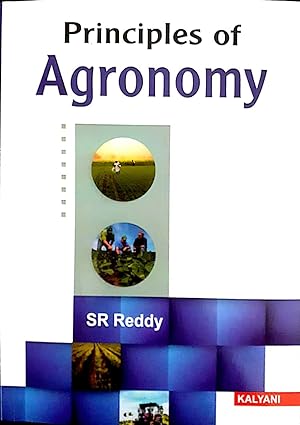-5%
Principle of Agronomy
Year of Publication 2
Original price was: ₹725.00.₹695.00Current price is: ₹695.00.
Comprehensive, vibrant and quality agricultural education system, in congruence with dynamic research and technology development setting, is fundamental to the national progress and prosperity. India's national agricultural education and research system the agricultural universities and ICAR institutes, through creating desired trained human ware, ushered in the rainbow revolution, led by the green revolution launched in the 1960s, transforming the foodgrain production in the country from begging-bowl to bread-basket. The agrarian progress during the past few years has, however, slackened and serious asymmetries exist in science-led growth of agriculture, farmers' income and food and nutrition securities. The food demand by 2050 is projected to almost double and is to be realised in an environment-friendly sustainable manner from the shrinking land, water and biodiversity resources. India's food and agriculture system is not so satisfactory, state and agrarian economy could partly be attributed to the decline in quality of agricultural education. As foremost step for quality improvement in education, the ICAR has appointed Fifth Deans' Committee for suggestions on holistic approach for quality assurance and effective governance in agricultural education. The Fifth Deans' Committee has articulated the knowledge and skills needed among the graduates and recommended curricula reforms and innovations for enhancing employability, employment potential, entrepreneurship and science-led transformation of India's food and agriculture system, enabling our graduates to become job-providers rather than job-seekers. Comprehensive textbooks covering principles of agronomy, as per the syllabus prescribed by the Fifth Deans Committee on Higher Agricultural Education in India, effective from the academic year 2016-17,
-5%
Principle of Agronomy
Original price was: ₹725.00.₹695.00Current price is: ₹695.00.
Comprehensive, vibrant and quality agricultural education system, in congruence with dynamic research and technology development setting, is fundamental to the national progress and prosperity. India's national agricultural education and research system the agricultural universities and ICAR institutes, through creating desired trained human ware, ushered in the rainbow revolution, led by the green revolution launched in the 1960s, transforming the foodgrain production in the country from begging-bowl to bread-basket. The agrarian progress during the past few years has, however, slackened and serious asymmetries exist in science-led growth of agriculture, farmers' income and food and nutrition securities. The food demand by 2050 is projected to almost double and is to be realised in an environment-friendly sustainable manner from the shrinking land, water and biodiversity resources. India's food and agriculture system is not so satisfactory, state and agrarian economy could partly be attributed to the decline in quality of agricultural education. As foremost step for quality improvement in education, the ICAR has appointed Fifth Deans' Committee for suggestions on holistic approach for quality assurance and effective governance in agricultural education. The Fifth Deans' Committee has articulated the knowledge and skills needed among the graduates and recommended curricula reforms and innovations for enhancing employability, employment potential, entrepreneurship and science-led transformation of India's food and agriculture system, enabling our graduates to become job-providers rather than job-seekers. Comprehensive textbooks covering principles of agronomy, as per the syllabus prescribed by the Fifth Deans Committee on Higher Agricultural Education in India, effective from the academic year 2016-17,


